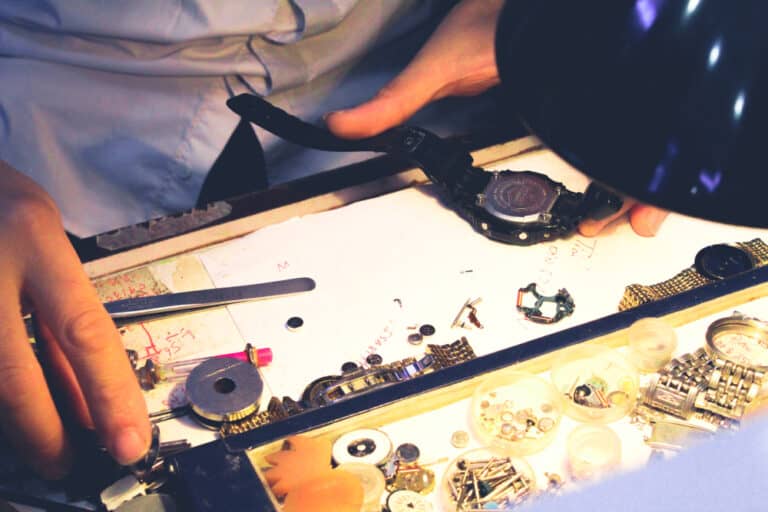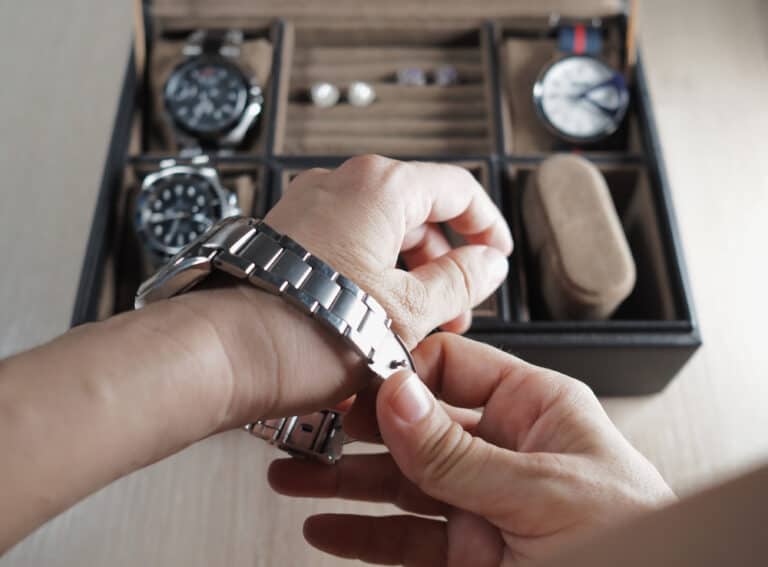Because the human body is one of the most complex organisms on earth, despite our ongoing study of its functions, many mysteries remain surrounding how it interacts with the world around it. Therefore, many people claim their bodies negatively affect the functioning of watches or kill watch batteries – but is there any truth to these claims?
Although there is no definite answer to prove or disprove the human body’s ability to kill watch batteries, some theories suggest that excessive sweat, abnormal electromagnetic fields, unusual bodily chemistry, or hereditary defaults may cause watch batteries to die.
Along with a deeper exploration of these theories surrounding the human body’s ability to kill watch batteries, we will also challenge these theories by showcasing alternatives as to why your watch batteries may be dying. Let’s explore both sides of the debate in greater detail below:
Can Your Body Kill Watch Batteries?
A brief discussion among a group of friends and/or a quick search through various online blogs/tech pages will unearth an exciting phenomenon. Namely, thousands of people report the unusual ability to kill/drain watch batteries.
Although this ability does not appear to be one that can be activated (at least our research shows no instances of active battery drainage.)
There’s no denying that this ability makes owning, buying, repairing, and wearing watches a hassle for people that have reduced battery life due to their body’s reaction to a watch’s batteries.
Many people who claim to have this ability tend to record it as being hereditary, with many commentators stating that immediate family members have similar battery drainage powers! (Although battery-operated watches only date back to the 1960s, making long-term claims/studies challenging to test.)
However, are any of these claims true? And if so, which of the leading theories has any basis in science/reality:
- High magnetism/electrical field,
- High skin acidity,
- Excess sweat,
- Hereditary problems.
1. High Magnetism/Electrical Field
Although it may sound like pseudoscience, the human body does produce small amounts of electromagnetic forces. The reason is that the human body is made up of trillions of cells that carry out thousands of metabolic activities every second.
Therefore, for the human body to function and perform metabolic activities, cells communicate with one another via small electromagnetic forces. While these electrical currents are tiny, they do exist, meaning that an electromagnetic field may extend beyond the internal system of a human body.
Consequently, one of the theories for why some people may kill watch batteries is due to these electromagnetic forces interacting and interfering with the delicate build of watch batteries. Thus, some people may have electromagnetic forces outside their control that cause watch batteries to die faster than regular people.
2. High Skin Acidity
At a pH level between four and seven, the human body’s skin is slightly acidic (considering a pH level of seven is considered neutral.) Consequently, a healthy pH level for the skin is just below five, making the average person’s skin slightly more acidic than black coffee.
Consequently, the pH level is vital to one’s skin health, whereby various dietary, hereditary, and lifestyle choices can negatively affect one’s pH level, including but not limited to:
- Acne,
- Skin conditions,
- Pollutions,
- Medication,
- Cosmetics,
- Detergents,
- Soaps,
- Skin moisturizers,
- Sweat,
- Water quality,
- Sun exposure,
- Excessive washing.
Because multiple factors affect the acidity of one’s skin and its pH levels, it is believed that changes to skin chemistry can negatively affect watch batteries. Some people believe that high skin acidity levels can interact negatively with alkaline watch batteries.
3. Excess Sweat
Although some watches are waterproof/water-resistant, many watches are not. Whereby even a tiny amount of water exposure can damage watch batteries (see below for further details.)
Consequently, people prone to excessive sweating may damage their watch batteries by accident due to water exposure.
Thus you should opt to remain cool if you are prone to excessive sweating or opt for an alternative watch that doesn’t need contact with your skin, like a pocket watch.
4. Hereditary Problems
Finally, because many people claim that their ability to kill/drain watch batteries runs in their immediate families, some theories suggest a genetic link between people that claim to kill watch batteries.
However, it is difficult to determine what hereditary factors may/may not affect watch batteries, meaning that it is likely a result of the combined theories mentioned above.
Can Your Body Kill Other Electronic Batteries?
While some claim that their ability to kill watch batteries extends to other electronic devices like remotes, cell phones, laptops, etc., it would appear that most people notice little/to no abnormalities around other electronic devices.
Although it is challenging to prove/test this phenomenon, a primary theory is that the delicate structure of watches and watch batteries means that the views mentioned above, like abnormally high electromagnetic force, high skin acidity, and/or excessive sweat, affect these light devices.
In contrast, larger devices like remote controls and laptops have larger batteries and sturdier designs, making them more resilient toward external/external elements.
Furthermore, these larger batteries are disconnected from the intricacies of the device itself, acting purely as an independent power source. For comparison, all the minute working parts of a watch interact, meaning they are delicate and prone to a shutdown due to minor damage.
What Other Causes Kill Watches?
Because the above reasons for why certain people seem to have the ability to kill/drain watch batteries are hard to test and prove, it is crucial to explore other reasons that can lead to damage to watches/watch batteries:
- Physical damage,
- Elemental exposure,
- Poor craftsmanship,
- External equipment/forces,
- Overwound watches,
- Confirmation bias.
1. Physical Damage
Because watches are very delicate instruments, even minor physical damage can have a knock-on effect that causes a watch to stop working or results in a battery dying/draining faster than usual.
Besides being cautious while wearing a watch, it is worth investing in a protective case when moving/transporting a watch, rather than simply allowing it to sit in luggage or be handled recklessly.
2. Elemental Exposure
While it is possible that excess sweat can cause damage to watches, it is more likely that open exposure to various elements is more likely to damage a watch. Consequently, watches should be protected from:
- Fires,
- Water,
- Excessive heat,
- Excessive cold,
- Corrosive materials.
Therefore, you should ensure your watch is insured against elemental damage before needlessly exposing it to outside elements that could damage it, such as heavy rain or lighting a fire while wearing a watch.
3. Poor Craftsmanship
Further to the above, not all watches are made equally. Watches likely have the most considerable price and manufacturing discrepancy among all products.
Consequently, watches can run the gambit of cheap over-the-counter watches for a few dollars up to luxury brands that can cost tens of thousands of dollars!
While price is not the sole determining factor when assessing the quality and craftsmanship of a watch.
It is safe to assume that luxury watch brands like Rolex have a standard of quality that far exceeds that of cheap no-name watches one may expect to find at a flea market.
Therefore, while many people may claim that their bodies kill the batteries of multiple watches over the years, they may be simply buying cheap/poorly made watches.
High-quality luxury brands usually have extensive warranties to guard against damage and a show of confidence from the watchmaker that their watches are unlikely to suddenly die/stop performing for no apparent reason.
4. External Equipment/Forces
Along with external elemental forces that can negatively affect a watch’s performance, various artificial/mechanical forces and devices can damage a watch.
Therefore, while there is a theory that suggests that the natural electromagnetic forces of some people may negatively affect a watch’s performance, it’s more likely that larger external electromagnetic forces from industrial magnets would cause magnetic damage to a watch.
Therefore, it is essential that you are aware of the equipment you are using/any equipment around a watch, so to avoid causing unnecessary damage to their intricate mechanisms.
5. Overwound Watches
Along with quartz watches, whose batteries and functionality may be damaged for many reasons, some people claim that their bodies can cause damage to other types of watches like mechanical watches.
However, many watch repair shops note that most people are unsure how to care for and treat older watch models. Namely, while it is vital to wind mechanical watches, most people are unaware that you can overwind a watch, which results in poor performance and damage (despite some watches having mechanisms like clutches to stop them from being overwound.)
Therefore, you should research watch maintenance to ensure you know how to care for your specific watch. If you do not have the instructions to care for a watch or are unsure how to do so, it is best to speak to a professional, as DIY solutions/maintenance may result in permanent damage.
6. Confirmation Bias
Although this article does not intend to categorically and objectively answer the question of “why some people’s bodies kill watch batteries,” as there need to be further scientific studies to prove/disprove these claims, it would be amiss not to talk about confirmation bias.
Confirmation bias is the tendency of people to process information in a manner that supports their existing beliefs while dismissing information that may challenge their current beliefs.
Consequently, while there are theories that suggest that the human body could kill/drain watch batteries due to abnormally high levels of sweat, electromagnetic forces, unusual body chemistry, and/or hereditary disorders – most studies find the possibility of bodily functions negatively affecting watches unlikely.
While these studies are not sufficient in dismissing people’s claim that their bodies are killing/draining watch batteries, it would point to an answer that confirmation bias is the primary reason behind these claims.
For example, if someone believes they have a hereditary condition that causes watch batteries to die, they may subconsciously seek and interpret information to prove this. Therefore, if they meet a family member who says their watch battery died for no apparent reason, this may confirm their beliefs.
Should they later receive information that their family member may have done something to cause their watch battery to die, like submerging their watch in water or being around industrial equipment with high magnetic forces.
Although confirmation bias is usually harmless when discussing the longevity of watch batteries (save for people not changing their habits to preserve their watches), confirmation bias can spread misinformation and pseudoscience around more pressing/serious issues!
Therefore, while you should be respectful and listen to the opinions/scientific theories of others, you should not be afraid to challenge and call out someone’s confirmation bias!

How Can I Protect Watch Batteries?
Because watches and, by extension, watch batteries are very fragile devices, you must take care when ordering watch batteries and how to take care of them.
The first step is to make sure you order watch batteries from reputable suppliers that can directly fit these batteries in your watch or can give you a guarantee/warrant that the batteries will work in your watch (this is very important, as poor quality/incorrect batteries can damage your watch!)
While storing watch batteries, you should ensure they are in secure packaging in a cool, dry area as overexposure to the elements, heat, cold, dust, and/or electromagnetic forces can damage watch batteries.
Finally, you should ask a professional to inspect the quality of a watch battery before installing them into your watches. It is not recommended that a “lay person” make a judgment call on the quality of a watch battery, nor should they attempt to install the battery themselves.
Conclusion
In conclusion, there are various conflicting theories that have been put forward to prove and disprove the existence of human bodies that kill/drain watch batteries.
While the answer to this question is still up for debate, it is important to respect the opinions of others while discussing this topic while also being aware of the existence of confirmation bias.
References
- https://www.quora.com/Some-people-claim-they-can-t-wear-watches-because-the-electricity-in-their-body-kills-the-watch-battery-Could-there-be-any-truth-to-this
- https://www.thenakedscientists.com/forum/index.php?topic=74885.0
- https://boards.straightdope.com/t/why-do-wrist-watches-stop-working-for-some-people/523222
- https://www.newschoolers.com/forum/thread/270628/People-whose-bodies-destroy-watches
- https://technology.blurtit.com/187566/i-kill-watch-batteries-i-recently-had-my-laptop-on-my-lap-it-wont-go-black-it-wont-work







